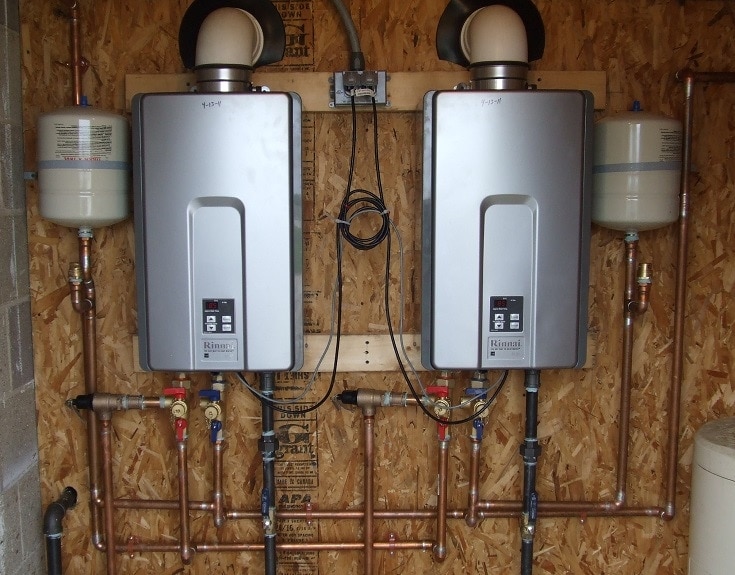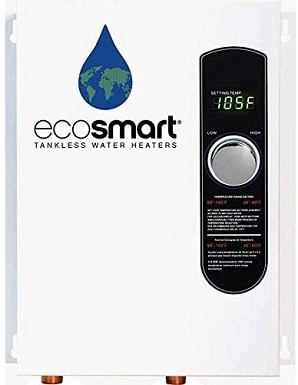Gas vs Electric Tankless Water Heater: Which is Better?
-
Pete Ortiz
- Last updated:

Water heating is one of the biggest expenses in your home, and choosing the right water heater can have an enormous impact on your finances. If you decide to purchase a tankless water heater, the next thing you will need to consider is how you will power it. Your choice is between propane, natural gas, and electricity. Of course, if you do not have access to a natural gas line, that option is off the table, but you can use propane or electricity. Gas heaters and electric heaters have different designs, and they each have pros and cons that we will review.
Tankless Water Heaters
Tankless water heaters are more efficient than traditional water heaters, no matter what type you use. They take up much less space, require less maintenance, and have a longer lifespan.
Electric Heater
Electric tankless water heaters, like the Ecosmart ECO 18, are very popular because they work well and are easy to install. Most experts recommend hiring a professional to take care of the installation because the wires need to connect to your circuit breaker. However, they will need to do very little work in comparison to installing a standard water heater or even a gas tankless heater.
It also takes up much less space than a gas water heater, and there is no need for expensive ventilation systems because the system does not produce any harmful gases. No gases means that it’s an all-around safer unit that’s better for the environment. Because you don’t need to be close to a gas line or ventilation shaft, you can install it in many more places, possibly leading to an even more efficient device that heats water faster because it doesn’t need to travel as far.
Electric tankless water heaters often have efficiency ratings in the high 90s and can usually deliver around eight gallons of hot water per minute. It may not be enough for a large family but is more than suitable for a single person or a couple. These devices often last well beyond their expected lifespan of 20 years, and they are much safer in the event of a flood or fire because there are no gas lines to worry about becoming compromised.
The downside to electric tankless water heaters is that it’s very possible to draw more hot water than they create. Laundry and showers, especially in large families, can cause the water to run cold. Though gas prices fluctuate considerably, an electric heater of any type is known to cause the bill to skyrocket. Its efficiency will make sure it only uses as much power as needed, but it’s usually still more expensive than gas.
- Less expensive than gas heaters
- Easier to install
- Smaller
- Doesn’t require ventilation
- More efficient
- 20+ year life expectancy
- Safer
- Environmentally friendly
- Better in the event of a natural disaster
- Expensive to run
- May not produce enough electricity
Gas Tankless Water Heaters
When talking about gas heaters, there are two types, and both deal with how the unit deals with steam.
Non-Condensing
Non-condensing heaters are the more traditional type. As the fuel heats the water, it creates high-temperature gases and requires an exhaust. These gases often exceed 300 degrees and are very corrosive, so they need vents that can deal with the high temperatures and corrosive gases. These vents are usually expensive if you don’t have them already and can significantly increase the cost of installation.
Condensing
Condensing heaters, like the Rinnai RU199iN, still require vents, but these devices keep the hot gases inside and use a special heat exchanger to cool the gasses to around 100 degrees. You can then vent these much cooler gases through a PVC pipe or something similar. Because the hot gases stay inside the device, the efficiency rating becomes much higher and, in some situations, can rival the electric tankless heater. However, the specialized heat exchange often raises the cost of these devices quite a bit.
Regardless of the type of gas heater you purchase, you can expect a unit that delivers plenty of hot water instantly. Gas can produce much hotter water than an electric heater, and large families that use a lot of hot water will benefit from gas heaters, as will commercial environments where running out of hot water is not an option. Sometimes, you can even have hot water when the power goes out. Gas-powered heaters are usually cheaper to operate than electric ones despite the wild fluctuations in fuel price and the relative stability of electricity.
Though the gas tankless water heater has an expected lifespan of 20 years, it will require vigilant maintenance to realize it. These devices require annual inspections by a professional, and they are prone to mineral build-up requiring regular manual flushing.
- Lower operating cost
- Delivers more hot water
- 20-year life expectancy
- Works without power
- Expensive
- Hard to install
- Require more maintenance
- Requires annual inspection
- Prone to mineral scale build-up
In Conclusion
When choosing a tankless water heater, the amount of hot water you need is the most significant factor. If you need continuous hot water, you should purchase a gas heater. Electric heaters are more expensive than gas models, but the efficiency and lack of required maintenance offset the cost. They also last a lot longer than gas heaters.
We hope you have enjoyed our look into the difference between electric and gas heaters and can determine which type is right for you. If you think it can help someone else, please share this guide to the difference between gas and electric heaters on Facebook and Twitter.
Featured Image Credit: Water Heaters (Image Credit: Behrat, Wikimedia Commons CC BY-SA 3.0)
Contents





